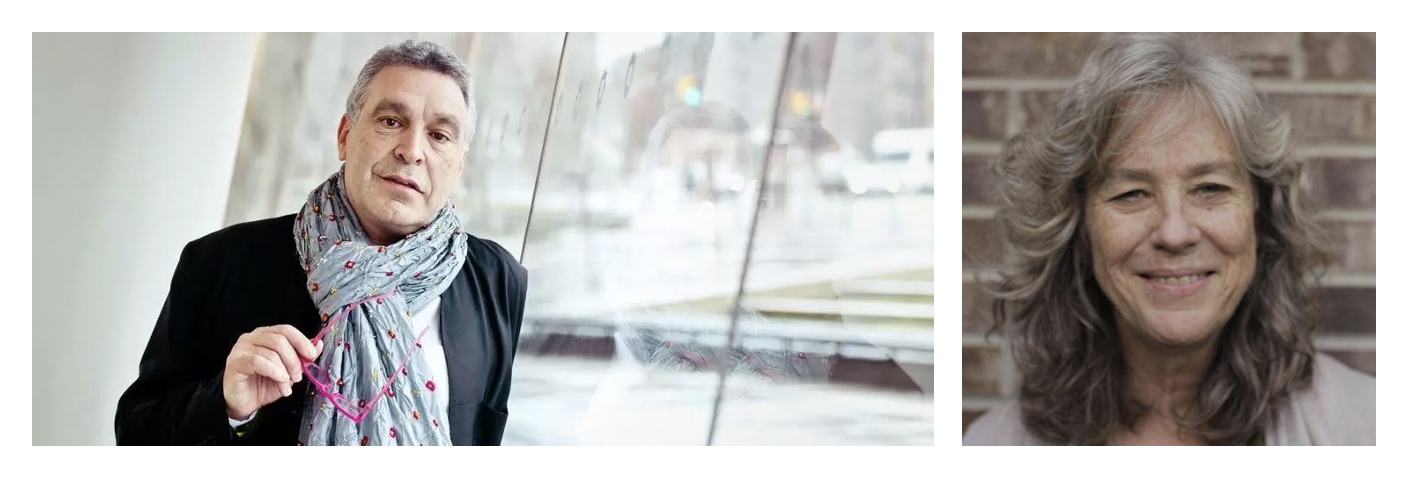
Left: Frédéric Brenner, by Gabriela Herman for The New York Times
Right: Wendy Ewald, by Denise Dixon

Left: Frédéric Brenner, by Gabriela Herman for The New York Times
Right: Wendy Ewald, by Denise Dixon
French-born, Berlin-based photographer Frédéric Brenner has spent a lifetime thinking about photography as an intimate art. Trained as a social anthropologist and best known for his two-volume collection Diaspora: Homelands in Exile, which won a National Jewish Book Award for Visual Arts in 2004, Brenner has established himself as one of the leading photographers of the Jewish experience around the world. Diaspora is the work of nearly three decades of documenting Jewish Life in Europe, the United States, and in places as remote as Yemen, China, or the former Soviet Jewish autonomous region Birobidzhan.
But it is not only the work of documentation. It is also an intimate portrait of individuals and families, whose faces have names, whose biographies have meaning, and with whom Brenner often developed enduring friendships. Some of Brenner’s earlier works include Jerusalem, Instants d'Eternité (1984), Jews/America/A Representation (1996), and Exile at Home. With a poem by Yehuda Amichai (1998). In 2014, he published An Archeology of Fear and Desire, which is his own contribution to This Place, a collaborative project involving 12 renown photographers seeing Israel/Palestine through their own distinct eyes. Brenner’s most recent project, Zerheilt: Healed to Pieces, is a portrait of reemerging Jewish life in Germany’s thriving capital. Following Paul Celan’s ominous line “They have healed me to pieces,” Zerheilt navigates a difficult path between signs of revival and traces of disfigurement exemplified in intimate portraits and personal stories that reveal not only Berlin’s chaotic landscape of identity but also the photographer’s intimate gaze.
Wendy Ewald is a US American photographer best known for her collaborative projects with women, children, families, workers, and teachers in the United States as well as in Africa, Saudi Arabia, Holland, Mexico, and Tanzania. Her projects are documentary investigations probing questions of identity and cultural difference. Frequently working with women and children of marginalized communities, she encourages them to use the photographic medium to explore their own lives, families and communities in new imaginative ways. Conversely, when acting as a photographer herself, Ewald invites her collaborators to alter her images by drawing or writing on them, challenging thus the relationship between subject and photographer, observer and observed, and questioning the rules of authorship and power.
Among her projects are Portraits and Dreams: Photographs and Stories by Children of the Appalachians (1976 to present), Retratos y Sueños (Mexico,1991), Black Self / White Self (1994-1997), American Alphabets (1997-2005), Towards a Promised Land (Margate, 2003-2006), and This is Where I Live (Israel/Palestine, 2010-2013). An acclaimed educator, Ewald has authored and co-authored more than fifteen books drawing on her projects and teaching experience, such as Magic Eyes: Scenes from an Andean Childhood (1992), Literacy & Justice Through Photography: A Classroom Guide (2011), The Transformation of this World Depends on You (2014; with Martha Saxton, Fazal Sheikh, and Thomas Keenan), and America Border – Culture Dreamer: The Young Immigrant Experience from A to Z (2018). Among her many honors are a Guggenheim Fellowship (2012-2013), a MacArthur Fellowship (2010), and numerous grants from the National Endowment for the Humanities, the National Endowment for the Arts, the Rauschenberg Foundation, the Andy Warhol Foundation, and the Nathan Cummings Foundation. Her photographs are featured in the collection of major institutions and museums, including the Metropolitan Museum of Art, the International Center of Photography, the Rhode Island School of Design Museum, and Labrador, Colombia, India, South the Whitney Museum of American Art.